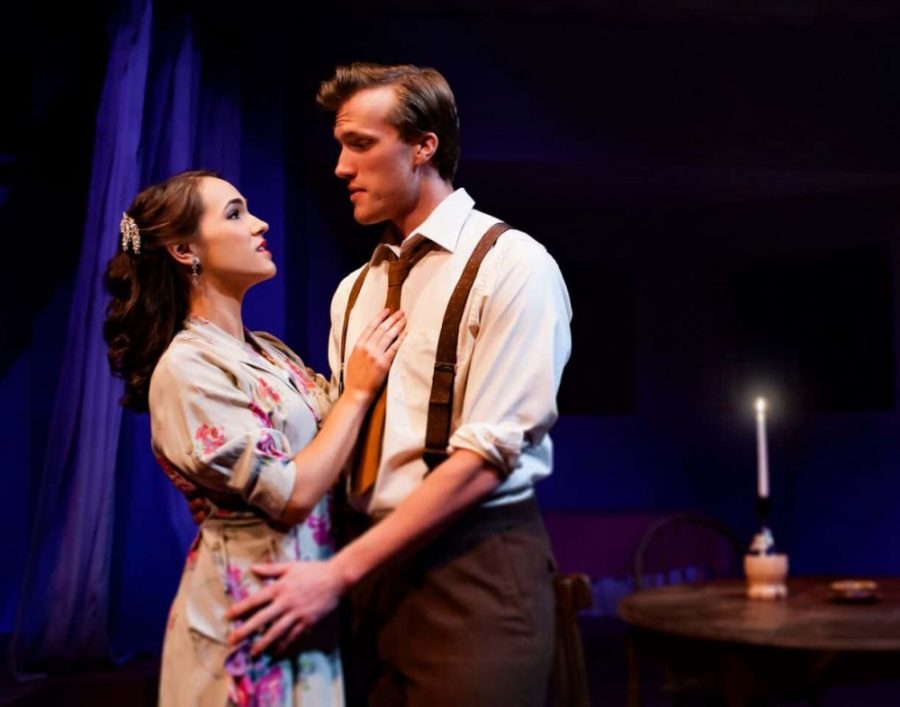On Wednesday, Nov. 8, the audience at Tornabene Theatre was transported out of the Tucson desert and into 1940s New Orleans as “A Streetcar Named Desire” began its opening night.
Seated quite literally inside the Kowalski home in the French Quarter, the audience was treated to two hours of high-quality drama. Being a small theater, it was an intimate but appropriate setting to see an iconic play being portrayed respectfully and authentically.
The main cast consisted of Marissa Munter as the emotionally frail and distraught Blanche DuBois, Vinessa Vodotto as the pragmatic and supportive sister, and Kasey Caruso, who is the primitive and lustful Stanley Kowalski.
Audience member and musical theater junior Quinn Corrigan noted that the chemistry between the leading actors was electric.
RELATED: “A Streetcar Named Desire comes to Arizona Repertory Theatre
Director Hank Stratton originally said the core of the story was a relationship between two sisters, and this was portrayed wonderfully on stage. Munter had the daring task of being Blanche DuBois, yet embodied the character with ease. She delivered the lengthy monologues without missing a beat and projected emotion and passion from her performance.
Munter’s portrayal of Blanche’s downward spiral was brilliant; she was nuanced in her performance — strong without being patronizing and hysterical without being shrill.
The other cast members were also fantastic. Kim Hunter’s film portrayal of Stella Kowalski left her dreary and submissive, but this was not the case with Vodotto’s interpretation. She was feisty and held her own voice, a standout in her own right. She was the perfect “cleft in the rock of the world” for Blanche to hide in.
By contrast, Caruso’s prowling Stanley Kowalski was crude and threatening to Blanche. Admittedly, Caruso had big shoes to fill given the role was popularized by Marlon Brando in the film, but Caruso was confident in his portrayal. His aggression was heightened by his dedication to the role, seen through how the audience flinched when he threw his plate onto the floor and smashed his glass into tiny smithereens.
A quiet but powerful character was Zach Zupke’s Mitch, who had a progressive character arc. Having a softer side than the other male characters, Zupke’s portrayal was complex, accurately depicting Mitch’s internal struggle.
Although the play is not a comedy, a reason why it is so brilliant is because of Williams’ ability to incorporate elements of laughter and light into what is otherwise a dark play.
In particular, this is seen in the interaction between Blanche and Mitch. As Mitch awkwardly slouches and towers over Blanche, he talks about his sweaty armpits and she attempts to seduce him in French. It is clear the two are incompatible, yet this heightens the sympathy toward Blanche as it becomes apparent she is so desperate for company that she’ll even take Mitch. The chemistry between Zupke and Munter is a pleasure to watch, and they bounce off each other to create a playful interaction.
Overall, the pacing of the play is fantastic. Munter captivates the stage as she takes the audience through Blanche’s thoughts in slow, lyrical moments, yet the play gains momentum quickly when the action rapidly turns violent.
The costuming also aided the authenticity of the production, as it transported the audience into the era. It was these fine details that made theater fanatics such as Corrigan appreciate the show more.
“The coloring — how Blanche was in lighter pastels, which shows more virgin [appeal], and Stanley was in more colors that fit his personality,” Corrigan said.
RELATED: Review: “Rent” struggles at times, but power of love pulls through
Now the production has a month to grow and expand until its final performance on Dec. 3, and Stratton is excited to see the cast explore the complexities of their characters.
“They have a month now to play the play … and they can continue to deepen their performances,” Stratton said. “They can continue to explore these characters, their stories and continue to tell their story; it cannot help but infect and affect them.”
For this remaining month, board member Joe Gootter is hoping as many people as possible will come to see the production.
“I think it’s educational, learning about the South and prejudice and low blue-collar,” Gooter said. “Relying on the ‘kindness of strangers’ — it applies to many people, and I hope people will not do anything other than get help from other people.”
As expected, seeing Tennesee Williams’ work brought to life was just as magical and relevant as it deserves to be. Stratton is very proud, and rightly so.
Although Williams’ lines have been uttered many times on stage, Stratton’s plan to honor the original play was successful, as the audience gave the cast a standing ovation at the end.
“The play belongs to the actors … and it is incumbent upon them to tell the story in a way that we have decided to tell the story,” Stratton said. “I’m really proud of them; I’m extremely moved by the depth and where they were able to get.”
The show will continue running until Sunday, Dec. 3, so be sure to book your tickets here; it is a classic American work that should not be missed.
Follow Daily Wildcat on Twitter









